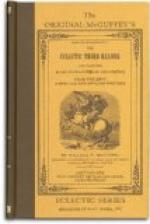sour found’ling fount an nounce’ment pout ground’less mount un found’ed soup rou lette’ croup crou’pi er roup group’ing wound trou’ba dour
Lesson 54.
36. The consonant C has two regular sounds: as soft c in cede, marked c; as hard c in cot, where it has the sound of k, and is marked c.
cives ac’id trace De cem’ber mace sol’ace brace in ces’sant clot tac’tic curd en act’ment acts traf’fic cave e lect’or
37. The sound of N as heard in link, is marked thus, n, which is the same sound as that represented by ng.
lank monk’ey drink con’gru ous monk con’gress trunk sin’gu lar sunk lan’guage conch drunk’en ness
Lesson 55.
38. S bas two regular sounds: when unmarked it has its sharp or hissing sound, as in yes; when marked thus, s, it has the buzzing sound of z in zeal.
sick mass’y smelt pos sess’ive pest vest’ment gross as sess’or has a muse’ grows re sem’ble ease in fuse’ ruse res’o nant
39. Ch has three sounds: unmarked (English ch), it has nearly the sound of tsh, as in child; marked thus, eh (French ch), it has the sound of sh, as in chaise; and marked thus, ch (Latin ch), it has the sound of k, as in chorus.
such speech’less child choc’o late chef ma chine’ chaise chiv’al ry chasm chem’ist chrism char’ac ter
Lesson 56.
40. G has two regular sounds: marked thus, g (g hard), it has the sound of g in go; marked thus, g (g soft), it has the compound sound of j, as in gem.
gear’ing gew’gaw slug gid’di ness gen’tile slug’gish crag guil’lo tine gen’der gest’ure gibe gen’er al
41. Th has two sounds: its sharp sound, as in thing, which is unmarked, and its soft sound, as in thine, marked th.
thin the’ist breath myth’ic al thaw the’sis theft the’o ry this gath’er thine hith’er to than both’er breathe oth’er wise
Lesson 57.
42. X has three sounds: its regular sharp sound (unmarked) like ks, as in expect, and its soft or flat sound like gz, as in exist, marked x;. At the beginning of words x has the sound of z as in xebec (ze’bec).
ex’it ex pan’sive’ ex tra’ne ous ex cel’ ex’pi ate ex te’ri or ex alt’ ex am’ple ex ec’u tive’ ex empt’ ex ult’ant ex or’di um
43. Q is followed in all cases by u, and has usually the sound of kw, as in queen; but in a few words derived from the French, qu is sounded like k, as in coquette.
quack queer’ly quoit qui e’tus queen quo’rum quote quo ta’tion plaque piqu’ant bisque co quet’tish clique’ co quet’ torque piqu’an cy
Lesson 58.




